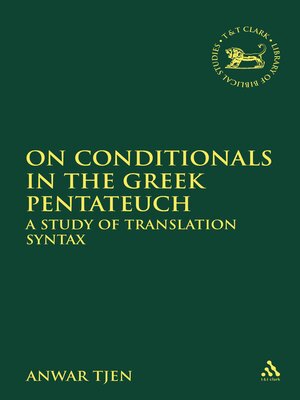On Conditionals in the Greek Pentateuch
ebook ∣ A Study of Translation Syntax · The Library of Hebrew Bible/Old Testament Studies
By Anwar Tjen

Sign up to save your library
With an OverDrive account, you can save your favorite libraries for at-a-glance information about availability. Find out more about OverDrive accounts.
Find this title in Libby, the library reading app by OverDrive.



Search for a digital library with this title
Title found at these libraries:
| Library Name | Distance |
|---|---|
| Loading... |
The book examines conditionals in the Greek Pentateuch from the point of view of the study of translation syntax. It takes seriously into account the double character of Septuagintal Greek, both as a translation from Hebrew and as vernacular Greek. Methodologically, the underlying Hebrew is taken as the point of departure in close comparison with the resultant translation, with the purpose of examining major features in the translators? handling of this complex construction. These include the rendering of verbal and non-verbal forms in the protasis and apodosis, the question of sense-division between the two constituent clauses, the influence of genre or discourse type and interference from the underlying form or structure.
Detailed analyses of the resultant translation displays features that are natural Greek, on the one hand, and features that betray the character of "translation-language", on the other hand, owing to interference from the source text. The latter manifests itself most conspicuously in renderings that are ungrammatical or unnatural, and, in a more subtle way, through equivalents which are grammatically acceptable but occur with a strikingly high frequency in the Septuagint as compared with original Greek compositions contemporary with the Septuagint.
Detailed analyses of the resultant translation displays features that are natural Greek, on the one hand, and features that betray the character of "translation-language", on the other hand, owing to interference from the source text. The latter manifests itself most conspicuously in renderings that are ungrammatical or unnatural, and, in a more subtle way, through equivalents which are grammatically acceptable but occur with a strikingly high frequency in the Septuagint as compared with original Greek compositions contemporary with the Septuagint.







